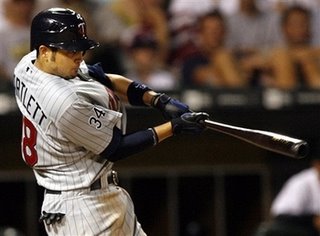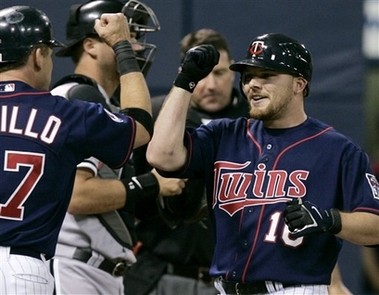September 5, 2007
The Pay Off: Part 2 (Jason Bartlett and Jason Kubel)
Baker is at a stage in his development that's similar to where Jason Bartlett was at this point last year. Whereas Baker posted a 6.37 ERA in 2006 and then began this season back at Triple-A in favor of Ramon Ortiz and Sidney Ponson, Bartlett hit .241/.316/.335 in 2005 and began last season back at Triple-A in favor of Juan Castro. After struggling in his first chance to claim the starting shortstop job, Bartlett got tons of criticism and little patience, much like Baker.
Then, like Baker did earlier this season, Bartlett performed well following his demotion to Triple-A and thrived when given another chance in Minnesota. Called up last June when the Twins finally decided to ditch Castro, Bartlett started each of the season's final 99 games while hitting .309/.367/.393 with 10 steals. However, just as Baker went through a rough patch upon rejoining the rotation early this year, Bartlett began this season with one hit in his first 20 at-bats.
Bartlett's slow start at the plate and some early problems defensively led to the return of frequent criticism, but he's fortunately turned things around and has been one of the team's few bright spots offensively. Bartlett has hit .275/.346/.380 with 21 steals in 121 games overall, including .285/.356/.396 with 20 steals in 23 attempts during the 114 games since snapping the season-opening slump. Add it all up and he's hit .290/.355/.386 in 220 games since getting a second chance and replacing Castro.
 MLB shortstops have hit .275/.330/.407 over the past two years, so Bartlett's .290/.355/.386 hitting line puts him solidly above average. According to Value Over Replacement Player, which compares hitters to other players at their position, his offense has been worth 18.3 runs more than a replacement-level shortstop this season. That ranks fourth on the Twins--behind only Torii Hunter (36.8), Justin Morneau (34.2), and Joe Mauer (28.0)--and ranks 13th among all big-league shortstops
MLB shortstops have hit .275/.330/.407 over the past two years, so Bartlett's .290/.355/.386 hitting line puts him solidly above average. According to Value Over Replacement Player, which compares hitters to other players at their position, his offense has been worth 18.3 runs more than a replacement-level shortstop this season. That ranks fourth on the Twins--behind only Torii Hunter (36.8), Justin Morneau (34.2), and Joe Mauer (28.0)--and ranks 13th among all big-league shortstops
Much like Baker's good pitching, Bartlett's good hitting matches up with his minor-league track record. Held back by the Twins far past the point when he had something to prove at Triple-A, Bartlett batted .323/.388/.458 in 186 games spread over three seasons at Rochester. He failed to thrive immediately in the majors, and as is often the case that made people forget that for the most part young players with strong minor-league track records eventually develop into good major-league players.
With two strong seasons now under his belt, Bartlett has officially cleared the hurdle to become a "good major-league player." Baker is about a year or so behind Bartlett, which means that he's in the process of getting over that same hump. Jason Kubel hasn't gotten past the "disappointment and criticism" stage of his development, but a closer look at his season shows a young player who appears to be setting himself up to follow the same path as Baker and Bartlett.
After missing the entire 2005 season following a career-threatening knee injury, Kubel came back last year and hit just .241/.279/.386 in 73 games. He showed some flashes of potential in limited playing time during the first half, but fell apart physically after the All-Star break, batting just .163 while often struggling to simply get down the first-base line. Given another chance this season, Kubel got off to a slow start by batting just .237/.287/.301 through early May.
Kubel broke a 0-for-11 slump by going 2-for-3 with a double on May 10 and has been one of the Twins' best hitters since then, batting .275/.338/.471 with 10 homers and 18 doubles in 79 games. Despite getting inconsistent playing time thanks to Ron Gardenhire often benching Kubel in favor of guys like Rondell White, Lew Ford, and Jason Tyner, among Twins hitters only Morneau (.517) and Hunter (.499) have a higher slugging percentage over that stretch.
 In addition to the excellent power, Kubel has also posted a solid batting average while improving his plate discipline and strike-zone control. He's drawn 26 walks in 285 plate appearances since May 10 after totaling 24 free passes through the first 403 plate appearances of his career, and he's done so while cutting his strikeouts by 20 percent. Even with his slow start thrown into the mix, among Twins hitters Kubel ranks fourth in slugging percentage (.425) and fifth in OPS (.750).
In addition to the excellent power, Kubel has also posted a solid batting average while improving his plate discipline and strike-zone control. He's drawn 26 walks in 285 plate appearances since May 10 after totaling 24 free passes through the first 403 plate appearances of his career, and he's done so while cutting his strikeouts by 20 percent. Even with his slow start thrown into the mix, among Twins hitters Kubel ranks fourth in slugging percentage (.425) and fifth in OPS (.750).
Kubel's turnaround has largely flown under the radar, but that doesn't mean that it should come as a surprise. He's a career .320/.385/.499 hitter in 448 minor-league games, including .328/.384/.538 with 20 homers and 35 doubles in 120 games at Triple-A. Just like Baker, Bartlett, and any number of guys before him, Kubel looks likely to become another example that for the most part young players with strong minor-league track records eventually develop into good major-league players.
The Twins have disappointed and frustrated this year, but the development of Baker, Bartlett, and Kubel are bright spots in an otherwise forgettable season. The paths they've taken show that early struggles are far from the end of the world for young players with strong minor-league track records, which is an extremely important lesson and one that will hopefully be applied to Kevin Slowey, Alexi Casilla, and the next wave of young talent.
Once you're done here, check out my latest "Daily Dose" column over at Rotoworld.

